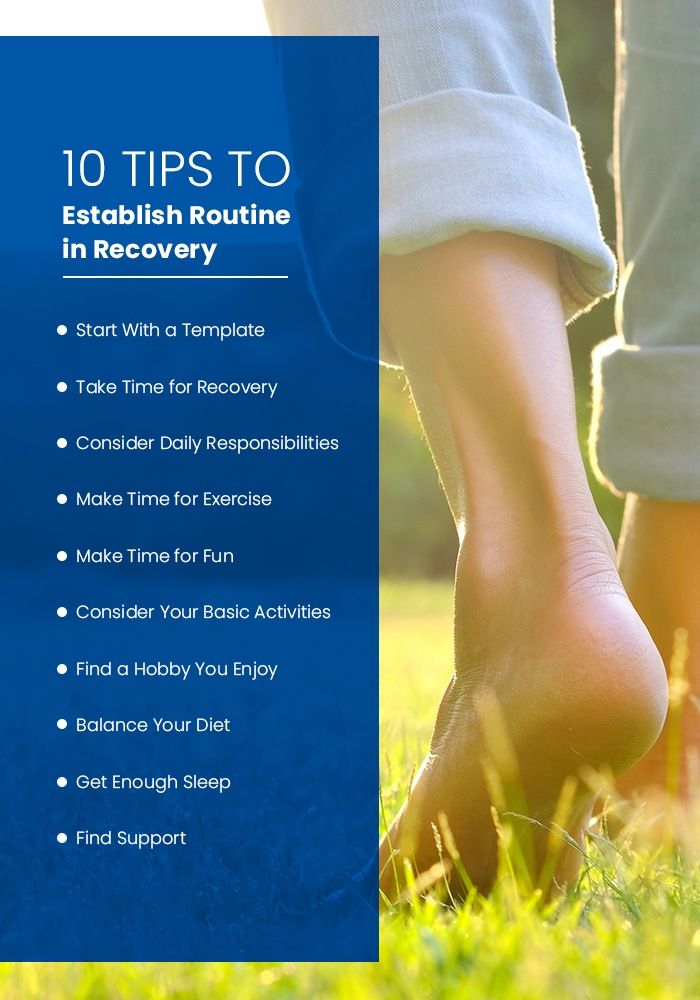Living a life with purpose and order is conducive to success.
Once you have embarked on your recovery journey, you begin to enjoy life’s simple pleasures that many take for granted. One of those joys is creating and keeping up with a routine that creates an environment for success. Although many dread their regular schedules, you find a sense of security and comfort in yours. You know that by sticking to your routine, you are taking steps daily to better yourself and your future.
Previously, substance misuse occupied the majority of your time and mental bandwidth. Now that you are in recovery, you have so much free time to fill with productive activities! Creating a routine in addiction recovery is essential to achieving long-term goals and ensuring that you stay the course.
If you are new to creating a routine for yourself, there are some things you will want to keep in mind. Starting things off on the right foot will make it easier for you to adjust to your new regimen.
Why Is Routine Important in Recovery?
A constructive routine plays a significant role in maintaining good mental health in recovery. When you establish daily patterns that benefit your physical health, you also reduce stress and use your time more effectively. Developing a structured routine also helps you make better decisions and avoid situations that may trigger cravings and relapse.
Addiction is partially the result of bad habit formation. Therefore, the creation of positive habits is necessary to stay strong in dismantling chronic substance misuse. Building a healthy daily schedule for recovery is the first step in starting your new life free from addiction.
Benefits of Having a Routine in Addiction Recovery
Although you may face challenges while planning, the benefits of a good addiction recovery routine follow you throughout your life. Save some patience for the process of assembling all the components of your new schedule. There may be some troubleshooting ahead, but it will all pay off in the end. These five advantages are just some of the incentives you can look forward to:
- Maintain purpose: Waking up to a schedule can give you an external sense of purpose.
Yes, even on those days when you may not be able to find a sense of purpose internally.
- Manage stress: Stress is a considerable part of what causes people to relapse. A daily routine can help you avoid stress and reduce anxiety when you are facing unexpected events.
- Improve self-esteem: Addiction to drugs and alcohol develops partly out of a sense of helplessness and low self-esteem. Creating and implementing your routine helps remind you of your self-efficacy and ability to direct your life.
- Improve brain function: A routine that includes at least 150 minutes of exercise a week improves blood flow to the brain. It also enhances brain function, which is important when healing from addiction. A clear head improves your ability to stay engaged and keeps you on schedule.
- Reduce chances of relapse: Boredom is often a factor in the development of addiction. Ensuring you have occupied most of your day in advance helps remove that element from your life. It also reduces your chances of using drugs or alcohol again.
Developing a routine in addiction recovery provides excellent stability and the opportunity to become the person you want to be. Everyone’s routine will be different, so use yours to maximize your health and further your recovery goals.
10 Tips for Maintaining a Recovery Routine

Reaching your recovery goals is easy once you have created a routine that supports your objectives. Once you have put in the leg work to get started, you will also have to maintain your momentum. These are our top recovery tips for staying on track.
1. Start with a Template
Visualization is essential for effective routine design. For that, you need a template of some sort to look at as you plan. You can use anything from a wall-mounted calendar to a pocket-sized notebook or smartphone app. Go for anything that will help you as you start to envision what your days will look like.
2. Take Time for Recovery
As you are building this routine to assist with your recovery, plan around activities devoted to your goals. Consider exercises like affirmations, meditation or journaling. Be sure to think about where they best fit in around your other obligations like work or school.
3. Consider Daily Responsibilities
For most people, work or school fills the bulk of their days. It is crucial to consider how these responsibilities might affect your emotions. You do not want to over-schedule yourself on days you work or attend classes. If you have a stressful job, give yourself a half-hour of decompression time before taking on another task. If you are a parent, build in some quiet alone time after the kids go to bed.
4. Make Time for Exercise
Exercise and recovery go hand-in-hand. While exercise is crucial to anyone’s recovery, everyone’s needs and preferences differ. One person might be happy getting a gym membership and spending several hours a week on exercise. Another person may be happy going for a brisk walk three times a week. If exercise feels stressful or if there are physical limitations on your ability to exercise, do not fret. You can find a type of movement that works for you with a little bit of research.
5. Make Time for Fun
When people complete addiction treatment, they often feel the need to make up for lost time. Some end up over-scheduling themselves as a result. Leave some flex time for things like socializing with your friends, spending time with your family or doing something you enjoy. While you should take your routine seriously, do not underestimate the power of a good time with even better company.
6. Consider Your Basic Activities
We all need to do specific tasks each day. Slotting them into a schedule is a vital part of developing an effective routine. Showering, brushing your teeth and eating breakfast are fundamental things you should do to maintain a healthy level of hygiene. You might try incorporating these tasks with recovery activities like meditation to ritualize them and make them second nature.
7. Find a Hobby You Enjoy
Hobbies have the dual benefit of acting as a fun time while also engaging you cognitively and improving a skill. Picking up a new hobby helps fill all the time you previously used to engage in substance misuse. The more a hobby engages both your mind and body, the better it serves as a stress-management tool. Many hobbies can also help you build a new social life. For example, it is perfectly fine to practice creative writing on your own. However, you can reap even more benefits from participating in a local workshop.
8. Balance Your Diet
Substance misuse takes an immense toll on the body. The substances themselves cause damage to bodily systems and indirectly cause problems due to poor dietary habits. Most people first struggle with nutrition and recovery in the beginning. It is critical to make time in your routine to prepare healthy meals that will help your body recover from the effects of addiction. Ideally, everyone would be able to prepare themselves three square meals a day. Try to aim for at least three home-cooked meals per week in your routine.
9. Get Enough Sleep
Sleep can be difficult for people in recovery. In the early stages of recovery, people are five times more likely to struggle with insomnia than the general population. Do not give up on your sleep cycle. Make sure you choose a bedtime and stick to it as part of your routine. Try doing something soothing and relaxing before bed, like taking a shower or having a cup of decaf tea.
10. Find Support
While addiction treatment may end, recovery itself does not. You will need addiction treatment support at times. Joining groups within the recovery community can provide a safety net when you need one. Regularly attending counseling sessions as part of your routine will help ensure you do not lose sight of your recovery goals. Your peers can also help you fine-tune your routine by letting you know what has worked for them. Together, you can collaborate as a group to work towards maintaining recovery.
Build a Routine in Addiction Recovery with AppleGate Recovery
AppleGate Recovery offers medication-assisted treatment to make addiction recovery more comfortable, manageable and attainable. Our individualized treatment plans integrate counseling and other recovery services into a comprehensive plan to address the root cause of addiction. Our experienced recovery counselors are happy to work with you to rebuild your routine and take control of your addiction.
AppleGate Recovery has multiple locations across the country to serve people from all backgrounds and walks of life. To learn more about what we provide and the next steps in seeking treatment, call 888-488-5337 or contact us online.


Contact AppleGate Recovery Today
If opioid addiction is impacting your life or the life of someone you care about, reach out to our treatment center. We are here to provide the support and care you need to take the first step toward recovery.
Call 888.488.5337